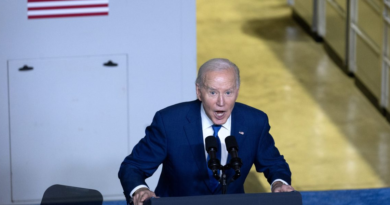Nvidia surges to become Wall Street's most valuable company as stock indexes hit new highs
The staggering run for Nvidia’s stock carried it to the market’s mountaintop Tuesday, as it became the most valuable company on Wall Street. Stock indexes, meanwhile, ticked to more records following the latest signal that the U.S. economy’s growth may be slowing without cratering.
The S&P 500 added 0.3% to set an all-time high for the 31st time this year. The Nasdaq composite edged up by less than 0.1% to set its own record, while the Dow Jones Industrial Average added 56 points, or 0.1%.
Underneath that calm market surface, Nvidia was the star again. It rose again, this time up 3.5%. It was the strongest force pushing the S&P 500 upward, again. And it lifted its total market value further above $3 trillion, again.
It grabbed the top spot on Wall Street from Microsoft, which has been trading the crown back and forth with Apple after they wrested it from past titans like Exxon Mobil and cigarette-maker Philip Morris.
Microsoft and Apple were at the vanguard of Big Tech, which is the dominant force in the U.S. stock market after amassing strength through the digitization of the world. Nvidia is riding the wave of a more specific tech surge, this time in artificial intelligence.
Chip wars
Nvidia’s chips are helping to develop AI, which proponents expect to change the world as much or more than the internet, and demand for its chips has proven to be shockingly voracious. Nvidia’s revenue routinely triples every quarter, and its profit is rocketing at even more breathtaking rates. Its stock is up nearly 174% this year, and Nvidia alone was responsible for nearly a third of the S&P 500’s entire gain for the year through May.
Of course, a potential danger of having a handful of superstars responsible for most of the U.S. stock market’s run to records is a more fragile market. If more stocks were participating, it could be a signal of a healthier market.
Stocks broadly got some lift Tuesday from easing yields in the bond market. Treasury yields fell after a report showed sales at U.S. retailers returned to growth last month but remained below economists’ expectations.
That could be an encouraging signal for the Federal Reserve, which is trying to pull off a tough balancing act for the economy. The Fed wants to slow the economy by just enough through high interest rates to get inflation under control. The hope is that it will cut its main rate, which is at its highest level in two decades, in time so that the slowdown stops short of a painful recession.
Hopes for interest-rate cuts
Following the retail sales data’s release, bets built among traders that the Federal Reserve will cut rates at least twice this year, according to data from CME Group. Fed officials themselves are largely penciling in one or two cuts in 2024.
The yield on the 10-year Treasury fell to 4.21% from 4.29% late Monday. The two-year yield, which more closely tracks expectations for the Fed, fell to 4.70% from 4.77%.
A survey of global fund managers by Bank of America showed they’re the most optimistic about stocks since the autumn of 2021, with relatively little hiding out in cash and allocations heavy to stocks. Fewer managers are also calling for a “hard landing” where the economy tumbles into a bad recession.
The downside of Tuesday’s weaker-than-expected data is that it could be a warning signal that the main engine of the U.S. economy, spending by households, is cracking. Alongside May’s numbers, the U.S. government also revised down figures for retail sales in prior months.
Inflation is still high, even if it’s slowed since its peak, and lower-income households in particular are struggling to keep up with the more expensive prices.
Lennar, a homebuilder, fell 5% after co-CEO Stuart Miller said “challenged consumer sentiment” and swings in interest rates are testing the company. Its stock fell even though it reported better profit for the latest quarter than analysts expected.
Shares of Fisker more than halved to 2 cents after the electric-vehicle maker filed for Chapter 11 bankruptcy protection. The company cited “various market and macroeconomic headwinds.”
On the winning side of Wall Street was La-Z-Boy, which jumped 19.4% after reporting stronger profit and revenue for the latest quarter than expected. The furniture maker said the current quarter is also off to a good start, with a solid Memorial Day, even as high interest rates keep a lid on housing activity.
Silk Road Medical jumped 24% after Boston Scientific agreed to buy the medical device company in a cash deal valuing it at roughly $1.26 billion, including its cash. Boston Scientific added 0.2%.
All told, the S&P 500 rose 13.80 points to 5,487.03. The Dow gained 56.76 to 38,834.86, and the Nasdaq composite edged up by 5.21 to 17,862.23.
In stock markets abroad, indexes continued to recover in Europe following last week’s rout. Surprise victories by far-right parties in elections had raised worries about the potential for mounting debt loads at the French government in particular.
France’s CAC 40 rose 0.8% for a second straight gain.
In Asia, Japan’s Nikkei 225 rose 1%. Heavyweight Toyota Motor climbed after its shareholders rejected a proposal to force Akio Toyoda, grandson of the automaker’s founder, to leave his post as chairman of the board.
___
AP Business Writer Elaine Kurtenbach contributed.




